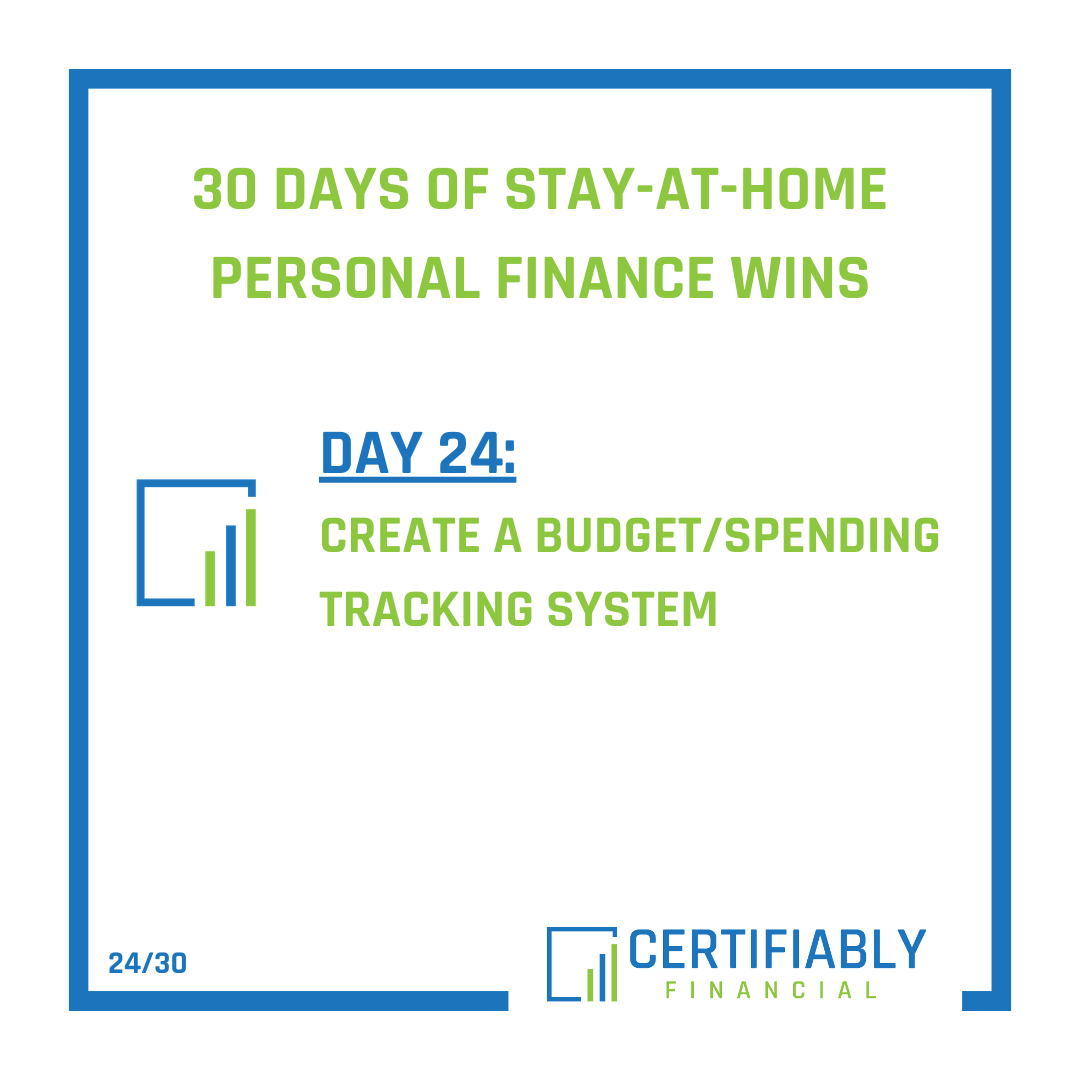What if you were able to come out of this time of social distancing and economic crisis with a stronger and healthier financial life? What if you looked at this as an opportunity to take a little bit of your extra time each day to work on your finances?
Spend
Day 10 Of 30 Days Of Stay-At-Home Personal Finance Wins: Review Your Spending
What if you were able to come out of this time of social distancing and economic crisis with a stronger and healthier financial life? What if you looked at this as an opportunity to take a little bit of your extra time each day to work on your finances?
The 3 Financial Tips Young Professionals Need
4 minute read
Keep The Big 3 In Check
The Big 3 are the 3 biggest expenses that most people have: housing, transportation, and food. Keeping these 3 costs in check will have a much more significant impact on your cash flow than skipping your morning coffee from a shop. Not only will being intentional about keeping these expenses low allow you more flexibility with your cash flow, but it will also allow you to maintain a higher savings rate (the next key we’ll speak about).
A rule of thumb that’s thrown around is that your monthly mortgage payment (including principal, interest, property taxes, and homeowner’s insurance) should be a maximum of 28% of gross income. However, many people fail to recognize this is a maximum. You’re probably already having a third of your income taken for various income taxes when considering FICA, Federal, state, and local taxes. If you’re spending nearly another third on your mortgage payment, then where are you going to get money to save, pay bills, or accomplish your goals?
Stretching your cash flow just to buy the house of your dreams probably isn’t a good idea. Adjusting your mindset and being willing to live in cheaper housing will provide much more financial flexibility in the long run. Once you’ve made a mortgage payment you can’t get it back unless you pay to take out the equity in your home.
Yes, we all want to drive a nice, brand new car, but is it worth sacrificing other goals over? New vehicles are expensive and transportation costs count towards a large part of many people’s cash flow. The point of having a car is to get from point A to point B and a cheaper, but still reliable car, does the exact same job as an expensive one – just not in as much style.
If cars are your thing and you’re willing to make significant sacrifices in other areas of your life to make sure that you’re able to reach your goals, then that’s fine. However, since experiences provide more happiness than things, I prefer to spend part of the money that I would on an expensive car on experiences that I’ll value for much longer and save part of it to help me reach financial independence. Cheap transportation still gets you to where you need to go and provides financial flexibility while doing so.
Cooking at home can be very time consuming, but it can also save a lot of money. The convenience of eating out is relatively expensive compared to buying groceries and cooking at home and can be much more calorically dense. Just consider the amount of meals that you can prepare with the $50 you might spend at a decent restaurant on a date night. Eating out doesn’t need to be cut out of young professionals’ budgets completely, especially if trying new foods and restaurants is something that really makes you happy, but it shouldn’t happen as often as you preparing your own meals. Cutting back on eating out can provide significant savings if it’s something that you do often.
Maintain A High Savings Rate
Starting out with a high savings rate is extremely beneficial to young professionals because of the significant amount of time that we have to invest the money. Additionally, saving a large percentage of your income can help to mitigate too much lifestyle creep and it can provide flexibility in the future when life happens and you’re not able to save as much as you need to.
Maintaining a high savings rate doesn’t mean that you have to save as much as possible or even have a high savings rate every single paycheck, month, or year. There will likely be periods of higher savings and lower savings – what’s important is that your savings rate remains high over time. Most young professionals won’t have pensions available to them and the future of Social Security for younger generations isn’t certain; it’s up to us to be responsible and create successful financial futures for ourselves by saving now.
Develop Good Financial Decision-Making Skills
Keeping The Big 3 in check and maintaining a proper savings rate are great financial habits, but what happens when something pops up that you weren’t necessarily ready for? It could be a financial emergency or a financial opportunity, but either way you need to be prepared to make the right decision for any situation. Having goals clearly stated for what you want your money to do for you can help with this.
How will you react when your car breaks down and can’t be fixed? Will you buy a brand new one that you’ll need to move on from in a few years because it isn’t practical long-term, buy a new car that you know you’ll be able to drive (and enjoy) for the next 10 years, or will you buy a cheaper, used vehicle that still has significant life left in it?
What about if you’re presented with a financial opportunity to help start a business or purchase a home for below market value? It’s important to revisit your goals and see if these decisions fit into them. Even if you’re able to buy it below market value, you probably wouldn’t buy a home if your goal is to find a job in a different city in the next 6 months.
Keeping The Big 3 in check, maintaining a high savings rate, and developing good financial decision making skills can all be invaluable to young professionals in the long run. These skills will not only allow you to develop a solid financial foundation now, but will likely carry with you throughout your life to help you to be financially successful. Money is a tool that we can use wisely to help us reach our goals or something that we can waste away without being intentional with it – I think that making sure it helps us reach our goals is a much better option.
Getting Back on Track
3 minute read
We don’t want to make it a habit to continue to do this and justify it as just a one-time thing that won’t have much of an impact over the long-term, because then it will become a habit and it will have an affect on reaching our goals. What we should is do not dwell on it and get back on track.
Another Holiday Mistake
Maybe you not only blew your diet out of the water over Thanksgiving, but you also blew through your budget. You didn’t plan on buying all of that stuff but then Black Friday deals and new and shiny and…Yeah, I get it. Unlike with what you ate, you can return the things that you bought and get your money back if you really don’t need or want them (hopefully, you don’t see that as an option for the food you ate, too).
However, if you could afford those things without affecting your progress towards your goals, and they’ll provide long-term value to you, then you can just keep them. There’s no need to worry or feel guilty about spending money that doesn’t negatively affect you reaching your goals because you’ve obviously budgeted to spend that money at some point.
Get back on track, follow your budget, and keep making progress towards your goals.
What you don’t want to do is to develop the “screw it” attitude and tell yourself that it’s okay to continue to buy things that you don’t really need or want because you’ve already screwed up. Well, I’ll just buy this one more thing that I really want. Oh, well, I really like that thing too and I already messed up my budget, so I might as well go ahead and buy it. The rabbit hole can be a tricky place to get out of.
Here are 3 tips to get back on track after overspending during the holidays:
Reevaluate Your Budget
Take some time to sit down and review your budget. Make any changes necessary to reflect your projected spending in December and create a plan for how you want your money to work for you. You could plan to spend less in the upcoming months to make up for your overspending this month, but how likely are you to stick to this once the time comes?
If you overspent significantly, then you may want to consider budgeting for these expenses beginning in January for next year. For example, if you think that you’ll end up spending $1,000 on Black Friday in 2019, then budget to save $91 per month from January through November.
Keep Your Eyes on the Prize
You’re going to see a ton of advertisements and “deals” in December. Don’t be tempted to go off budget and spend money on something that you haven’t budgeted for and don’t really need or want. If you needed it or wanted it that badly, then you would have included that within your December spending projections or, if it’s a big ticket item, you would have started saving for it a while ago.
The prize isn’t that new gadget that you see an ad for on TV and feel compelled to buy, the prize is knowing that you’re one step closer to reaching your goals and to financial freedom
Track Your Progress
Make a point to sit down each week and record your spending. Take note of how much you’ve spent in comparison to your projections and if you need to adjust to compensate for overspending or if you have some wiggle room to buy something that you haven’t planned on. Or, you could save any extra money and get a head start on your 2019 savings goals.
Proactively tracking your progress not only keeps you aware of where your money is going each week, but it can also serve as a weekly dose of motivation to make adjustments to make sure that you reach your goals.
Thanksgiving has come and gone – don’t worry too much about how many thousands of calories you ate that you maybe shouldn’t have or the money that you didn’t really plan to spend. Getting off track every once in a while doesn’t mean that you’ve ruined everything, but it also shouldn’t be used as an excuse to continue making the problem worse. Learn from the mistakes that you made, make them better if you can, and set a plan of action to help make sure that you don’t make those same mistakes again in the future.
Black Friday
3 minute read
Obviously, we can tell from above that I’m not a Black Friday shopper. We hear every year about some of the horrible things that people do to others on this day and I don’t want to have to witness anything like that. I don’t even want to watch it on the news. I get stressed out enough just going to the grocery store on a busy Sunday.
Evidence tells us that more stuff doesn’t provide happiness to our lives. Take a second and think about your own life. How much stuff do you have in your garage, your basement, your attic, or that extra room in your house that you haven’t used in the last 6 months? The last year? The last 5 years?
Is it really that important to keep around if you haven’t used it in that long? Do you really need a whole room in your house dedicated to just storing the stuff that you never use? Not only is that an inefficient use of your space and money, but it’s clutter in your life that you clearly don’t need.
I think a lot of the time people get sucked into Black Friday deals without actually taking time to consider if they really “need” what they’re buying or if they’ll actually use it once the new wears off.
Think about it this way: If the item you’re going to purchase on Black Friday weren’t on sale, would you buy it anyways? Most of the time, I’d bet the answer to that is “no” and that tells me that it’s probably not really worth that much to you.
I challenge you to reconsider what you’re going to purchase on Black Friday, and for holiday gifts in general. Is it really worth standing in line forever and witnessing some of the things that people do and say to each other just to save some money on something that you’ll probably forget about or replace in a year or two? Are the gifts that you’re planning on giving to people really going to provide long-term happiness to them?
What if you took that money and instead provided an experience that they’ll be more likely to remember and feel is special, rather than giving them a material gift? Take them out to dinner, give them tickets to a sporting event, or take them to do something that they’ve told you about but haven’t gotten around to yet. Even though you don’t have a tangible good to show for the money that you spent, I still think this is a better use of it.
We’re one of the wealthiest countries in the world, yet the majority of us have very little saved, or aren’t saving, for retirement. We have houses full of stuff that we rarely use but we’re still enamored on getting deals on things on one of the biggest shopping days of the year. Are we that much more worried about having new stuff and toys than our own futures that we can’t exercise the discipline that it takes to save? We spend so much of our money on “wants” rather than “needs” without regard to where money will come from in the future when we’re no longer able to work. What does that say about us?
Fortunately for me, I have others around me who aren’t obsessed with getting a deal on Black Friday and I’ll get to spend time with them. If I do end up getting a gift that came from a Black Friday sale, then it’ll probably be tickets to a Pacers game and I’d value that much more highly than some t-shirt that probably won’t fit or some trinket that I’ll never use. That experience will mean more to me, last longer in my memory, and probably make me happier than any material thing that someone could save a couple of bucks on at a Black Friday sale and give to me.
Yeah, you might save some money, but is it worth it? Especially for something that comparatively probably won’t provide you that much happiness. For something that you’ll be excited about for a couple of months and then forget. For something that’s going to add more clutter to your life.
Money Well Spent
3 minute read
I have to admit, up until a couple of weeks ago I’ve been playing in the basketball shoes that I got before my senior year of high school basketball in the fall of 2010, probably around this time. That’s 8 years of playing basketball in the same shoes. Over 8 years, those shoes went through high school basketball, countless pick-up games in college, and pick-up basketball post-college as well.
I’ve been badgered by my friend, Jared (check out his new blog here), almost every time we’ve played together for the past 2 years to just get a new pair of shoes already. But I hate spending money on clothes and shoes. The shoes that I have get the job done so why get a new pair? Sure, they’re worn out and a little beat up (maybe on the edge of a lot worn out), but they still fit and don’t have any significant problems.
Last month, I finally had enough of my feet feeling like I ran a marathon barefoot on gravel for days after playing basketball in my trusty 2010 Nike Hyperdunks. Of course, I wasn’t going to go out and buy a pair of shoes for full price without doing some research. I’m particularly picky about the way that clothes and shoes fit.
I’m never going to be accused of being fashionable and I don’t really get much joy from having the newest stuff, but what I really, really do care about is comfort. If something isn’t comfortable to me, then I’m just not going to wear it. I don’t care how stylish it is or how cool people may think it is, if it’s not comfortable it’s not worth it to me.
Comfortable basketball shoes aren’t cheap. Luckily, I remembered that I still had a $25 Nike gift card from last Christmas that I hadn’t used.
After doing some research, I found that Nike had PG2s and Kyrie 4s on sale on their website. Both of these shoes have very good reviews and sound like something I’d like to wear when playing basketball. However, I couldn’t just buy them online without trying them on first. I’m weird like that. I have to know that they’re comfortable. I don’t want to go through the hassle of returning them and waiting to get another pair.
There was a problem though. In my quest to delay spending money on the shoes as long as possible I ended up waiting too long to go try them on and the pairs that that were for sale online sold out. So, I ended up trying on the latest version of the PGs and Kyries since they’re on the lower end of Nike basketball shoe pricing while maintaining very good reviews. I tried on the PG 2.5s and found them very comfortable, which is in-line with what I had read and with the reviews of many other professional basketball players who wear the shoes.
I tried on the Kyries and they felt like I was wearing moon boots.
I was torn. I found shoes that I liked, but I didn’t want to pay $110 (pre-tax) for them.
Here’s how I got them for 72% of the cost (Fair warning: Most people won’t have this option).
Remember the gift card from above? That was obviously where I had the most savings. Don’t throw those things away when they’ve been in your wallet forever – they may still have some value. Next, I found that college students receive a 10% discount on their first online Nike purchase. Thanks for being in college, Amanda! I also have the Ebates plugin installed on my browser which saved me an additional $1.65 – a small amount, but still savings. Add in taxes of $6.93 and I bought a $110 pre-tax pair of shoes for $79.28, including tax.
Even though I saved so much on the shoes, I still initially felt a little guilty spending the money. But, after playing in them a handful of times so far, it was so worth it. I forgot what it was like to wear comfortable basketball shoes that don’t leave your feet feeling like you ran on rocks the whole day before for multiple days afterwards.
This is something that I’ve written about before, and it’s something that I struggle with sometimes as well, but spending money is okay when you’ve planned for it and it doesn’t negatively impact your financial goals. Those who are dedicated towards saving and making their money work for them often have a hard time spending it on themselves, even when that’s what they’ve saved it for.
But, sometimes it’s worth it.
You Can’t Take It With You
4 minute read
True, you can’t take it with you. But, you also can’t get it back once you spend it or give it away. No, I don’t think that money should be your number one focus in life or that you should try to save as much as possible to make your life better and never use it to enrich the lives of others, but I do think that saving for, and thinking about, your future is important. Too many people don’t think about their future selves and how the money that they are (or are not) saving today could affect not only their life, but their family’s life, and the lives of others.
Justification to Spend
I’ve heard “you can’t take it with you” more in my life in terms of spending money on something that someone probably shouldn’t be spending money on. It’s a term that’s used as a justification to spend blindly, without regard to a budget or how else the money could be used. If this mindset continues over a significant period of time it could have negative financial consequences later on. Your spending and giving should both be within the realms of your financial plan and budget.
There are so many options for money. You could use it to buy something today or you could invest it for your children’s education (a form of giving). Would it make you happier to buy a brand-new car today or to know that your children may not have to suffer the burden of student loans?
Justification to Give
Maybe you use the “you can’t take it with you” mindset in terms of giving. While this is a much more honorable use of the money, it can be detrimental to your financial situation as well. Spending and giving both mean that you have less money, no matter where the money goes.
It’s important to ensure that your giving is built into a financial plan and, just like with spending, that it won’t leave you in a bad financial situation. Some people try to take care of family members by continuously giving them money or paying for college and ultimately sacrificing their own financial independence. It’s ok to take care of yourself and make sure that you have a stable financial situation before considering giving to others. In fact, it’s what you should do. You don’t want to be the one who gives so much that you end up on the other side of the equation.
You Can Use It To Help Others
How would it make you feel knowing that spending and saving your money wisely could positively impact countless people through charity by investing is prudently now rather than spending it because “you can’t take it with you when you die”? Utilizing this mindset may make you think twice the next time you want to spend money on something that doesn’t provide much value to your life.
You may not be able to take it with you when you die, but if you invest it wisely, there could be a lot more there to help many others when you die than if you spend it all because you can’t take it with you.
There absolutely is merit to giving money every year to charity or church. However, I want to explore an alternative scenario.
If you invested $1,000 every year over 30 years and received an average rate of return of 6%, rather than donating that $1,000, then you’d have $79,058 to give to charity versus the $30,000 that you would have given over 30 years.
What if you did give $1,000 to charity every year, but you also found $1,000 to invest, with the intention of giving it to charity in the future, because you reevaluated your “you can’t take it with you” spending and cut back? Now, you’ve given $30,000 in addition to the $79,058 at the end of 30 years.
Increase the amount in the first scenario above to invest $5,000 per year and the amount you’d have after 30 years increases to $395,291.
I was a little shocked when I saw the difference, too.
Could you cut back on spending on things just because you can’t take it with you to potentially provide $395,291 of benefit to others later in your life?
Spend & Give With Justification
Am I telling you that you shouldn’t give money to others, charity, or your church and that you should invest that money instead? No. There are people and organizations who can really use that money now and lives that could be changed with it. I’m attempting to offer a different viewpoint of how you could use money that you currently spend without good justification. No, you can’t take it with you when you die, but you can choose to utilize it more wisely and help others, if you feel called to do so.
Ultimately, it’s best to build the “you can’t take it with you” money into your financial plan and make sure that you’ve taken care of yourself as well. Make a commitment to not only help others through your giving, but to also help yourself as well through developing a well thought out giving strategy. You can do so much more with your money to benefit all parties, if you plan for it.
Binge Spending
3 minute read
When I think about the term “binge” I immediately think of binge eating, binge Netflix-ing, or binge drinking. When I use the term “binge spending”, this is exactly what I mean – spending a lot of money in a short amount of time.
Binge Eating
I compare this to a diet. You’re doing well on your diet for a couple of weeks when one of your friends asks you to go out for pizza. You think, “Okay, I’ll do really well this week and save some calories for pizza and maybe a couple of beers Friday night with friends.” When Friday night comes around, you’ve done well all week and have set yourself up so you can enjoy some pizza and a couple of beers with your friends without any guilt.
But, by the time you’re done you’ve had a whole pizza by yourself and enough beer to drown a whale.
Then, the next day you think, “I already messed up yesterday, and I feel bad about it, so cheating again today isn’t going to be a big deal.” You’re mentally fatigued from all the restriction. Now, you’ve got some momentum going down the wrong path and you’re more likely to make poor decisions again. I’ve seen it happen to myself and to others.
“Just this once” turns into a habit.
Restriction Can Cause Bingeing
This is exactly why traditional diets don’t work well. They’re too restrictive. Once you get a taste of something that your diet restricts, you continue wanting more and more of it. Your body doesn’t work on a 24-hour clock and neither does your money. Your body is constantly functioning and works on a long-term timeframe as does your personal financial situation. You’re likely going to be alive for a long time, according to statistics, and the one-time binge isn’t going to have a significant impact over that timeframe as continued bingeing will. You can fit those extra calories in or that extra spending into your budget if you change the timeframe in which you’re measuring it as a failure.
Sure, people lose weight from following diets all the time, but the real problem is that they regain that weight the majority of the time. I’ve read someone make a statement before that “America doesn’t have a weight loss problem, it has a weight regain problem.” I don’t think this is too far off. How many times do you see someone do really well and lose weight just to regain it a year or two later?
The same can be said for your financial situation but personal finance isn’t as public as weight loss, so it’s harder to see in people’s lives. People will post on social media all the time and say, “I can’t believe I’ve lost 10 pounds in a week! #FitFam #Fitspiration” (There’s a whole slew of problems with this statement that I’m not even going to get into). No one ever posts and says, “Hey guys, I’ve been really diligent in making personal finance changes and spending wisely and I saved $500 this week compared to what I’d usually spend!”
Binge Spending
Binge spending happens to people when they’re making great progress towards their financial goals just like binge eating happens to people when they’re making great progress towards their physique goals.
Don’t be so restrictive in your spending and budgeting that you go off the rails when you finally treat yourself or buy something that you’ve been wanting. Build some treats and things that you enjoy into your budget regularly. You need to allow yourself to spend money on things that you enjoy. Otherwise, what’s the point in earning more money than necessary to cover the basics?
Prolonged bouts of poor financial decisions will have a much greater impact on your financial situation than one bad choice. Don’t let yourself go down a path of “binge spending” because you’re so restrictive on yourself that once you do actually spend on something you get a little taste that you want more and more of. Continuing to spend money on things that you haven’t planned for just takes you that much farther away from reaching your financial goals.
Whenever you make a poor money decision, just accept it and get back on track. Don’t compound the negative effects by continuing to make more negative financial decisions just because the first one gave you momentum to do so.
I also probably wouldn’t recommend a “Treat Yo Self Day”, unless you’ve budgeted for it.
Parks and Recreation – Treat. Yo. Self
I do not own this








